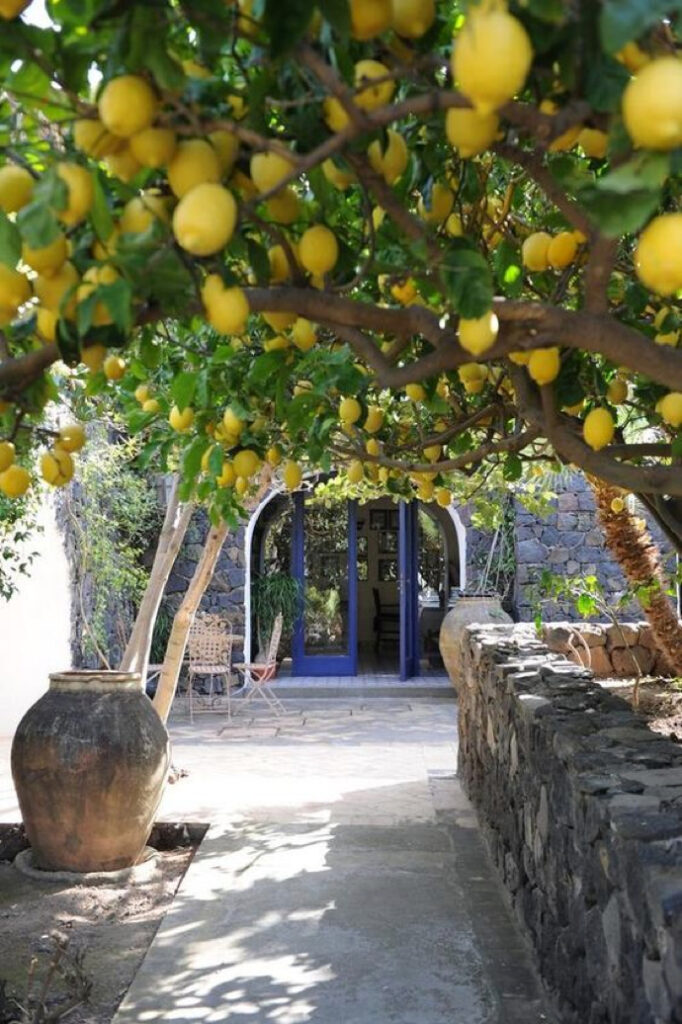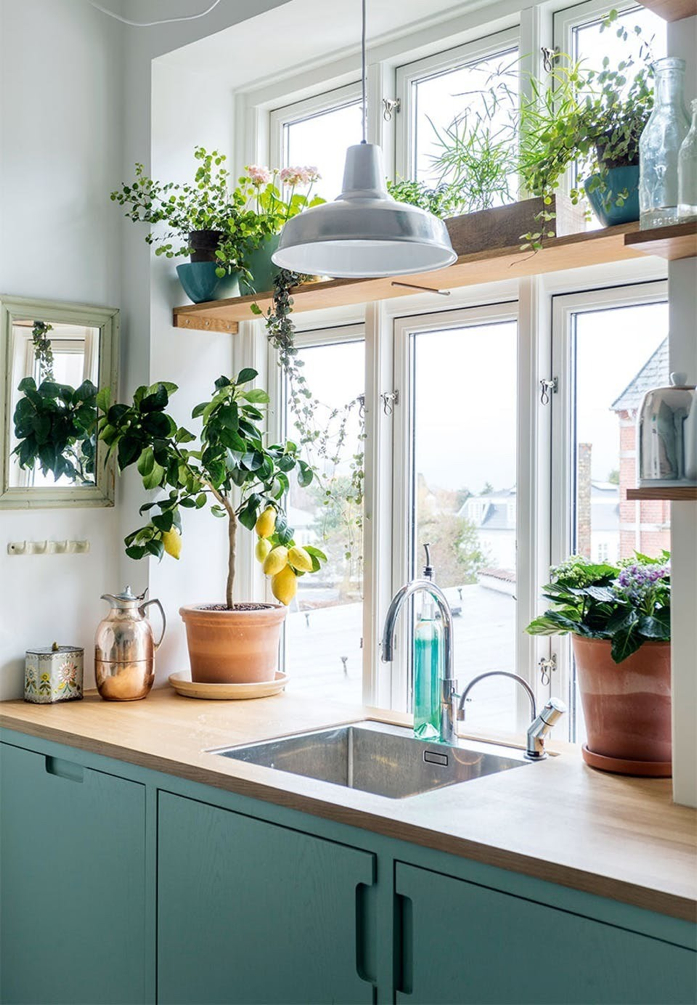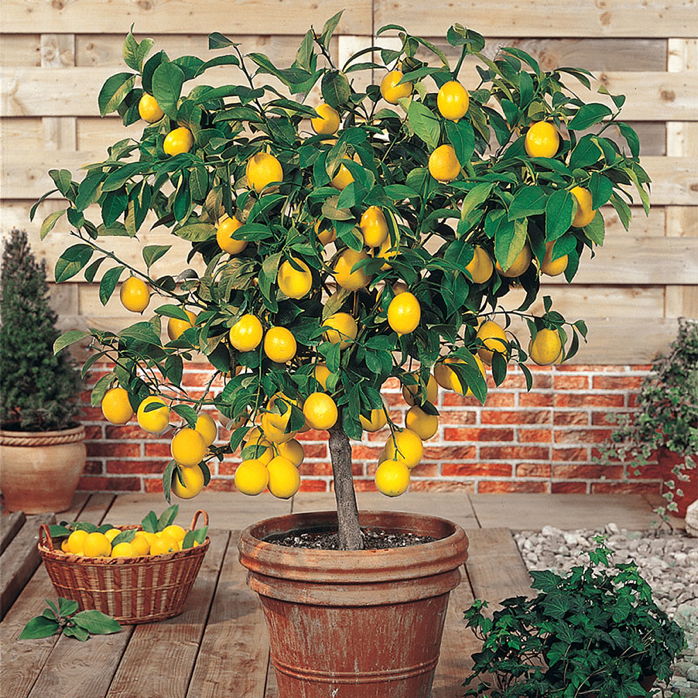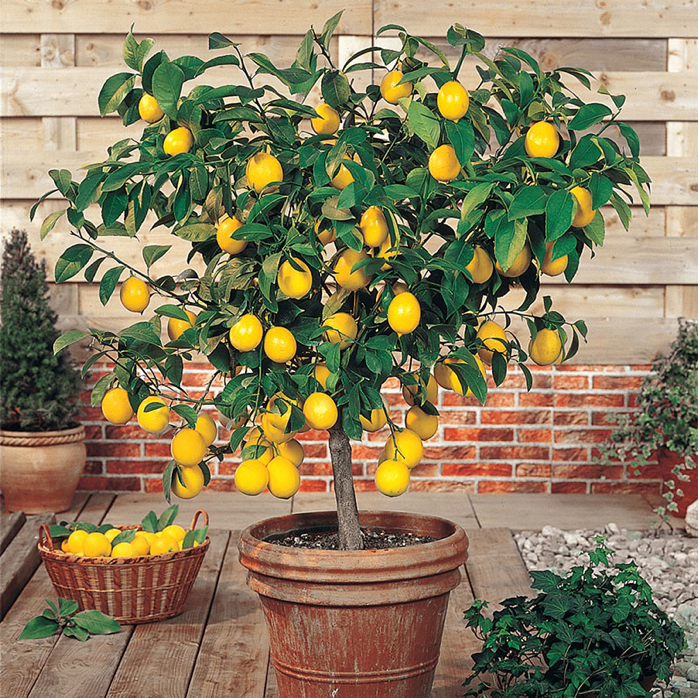
I wonder if the lemon tree I have will grow to such proportions like those pictured above- wow! My Meyers lemon tree had a rough start to the Winter because I forgot to bring it in before the temps fell below freezing. When I finally brought it in (it was already in a container), it had lost quite a number of leaves. However, I’ve been giving it extra attention and the first thing I did was find nice sunny window spot for it and now it’s looking much better and even sprouting new buds.

I recently shared a pic of my lemon tree on Instagram and apparently many of you wanted to know how to care for a lemon tree during the Winter months. I did some research and here are some great tips from Anna at Daves Garden:
Choosing The Pot
If your lemon tree was planted in the ground, you’ll need to pot it in a container. Dwarf citrus trees do not grow as large as their full-size relatives, thanks to their dwarf rootstock. To accommodate your citrus tree, choose a pot that is slightly larger than your tree’s root ball. Your pot can be ceramic, plastic, or clay, depending on your taste, but keep in mind that you will need to move your pot around occasionally and a lighter material is easier to maneuver.
Watch the Water
Citrus trees like well-drained soils because they don’t like to have wet feet. Hanging around in soggy soil increases your tree’s risk of disease. Most indoor citrus growers can get away with watering only once a week in the winter when your tree is dormant. Keep your pot on the dry side of moist and your plant will thrive. If you’re worried about overwatering, try using a soil moisture meter.
Citrus trees might like drier soils, but they don’t like dry air. Place a humidifier near your citrus tree or put a tray with pebbles beneath your pot and fill it with water. As long as the bottom of the pot is not sitting directly in the water, this will help keep the tree humid.

Citrus Soil Requirements
Citrus trees have their own unique soil preferences. I will be the first to admit that I buy pre-mixed potting soil designed for citrus trees when I can find it so that I am sure I am giving my plants the right mix and soil pH. Citrus trees like well-drained, slightly acidic soils. If you can’t find a citrus mix, add sand to standard potting soil to improve its drainage or place pebbles in the bottom of the pot.
You can also give your plants a boost with a specialized citrus fertilizer. I find that adding a fertilizer once a month is the easiest way for me to keep track of my tree’s nutritional needs and keeps them happy and healthy until the spring.
The Transition
Remember how moving towns as a child felt like your parents had ripped you out of a comfortable environment full of familiar friends and places and dropped you into a terrifying and strange new land? Your citrus tree will feel the same way if you don’t transition it slowly, complete with that same wilting feeling you had on your first day at a new school.
A few weeks before the first frost, start moving your citrus tree into the shade in the afternoon. Do this for two weeks, then leave it in total shade for two more. This helps your plant adjust to the lower light levels of its new indoor environment.
Get Rid Of Unwanted House Guests
Your citrus tree is a Trojan horse for unwanted pests. Right before you bring it inside for good, take the time to do a little cleaning. Spraying your tree’s leaves and trunk down with a hose will remove some of the pests. Once your tree dries, treat it with an insecticidal soap to kill any remaining bugs and bring it indoors.
Aphids, spider mites, scale bugs, and other pests can pose potential problems for indoor fruit trees. Keep an eye out for these pests and treat your tree with a horticultural oil or other pest control method.
Location Matters
Place your tree by a sunny window, preferably facing south. If you have a greenhouse, sunroom, or solarium, even better, but a sunny window will do for most plants. If you live in a far north climate and want to add more light, install a grow light near your citrus tree to give it a boost.
I hope you find these tips useful. I’ve found that my lemon tree also acts as an air freshener. I love getting a whiff of it as I walk by the space it’s in. xx
images: {pinterest, gardensalive}




